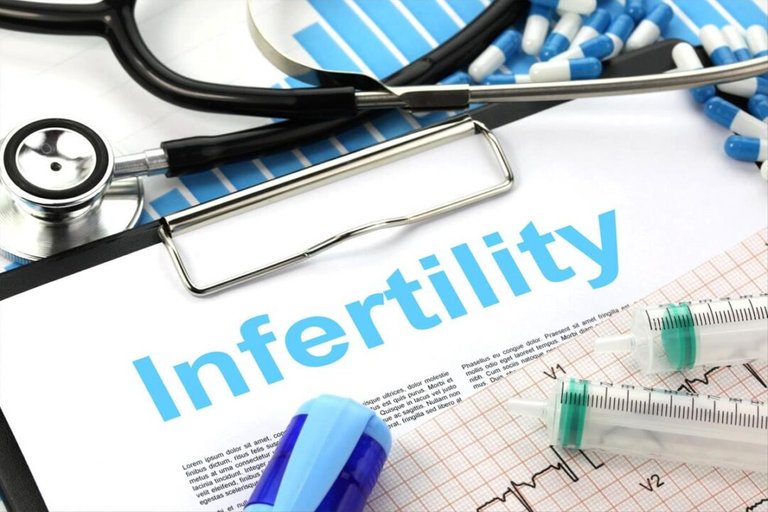Premature Ovarian Insufficiency Explained
Hello Stem community, I hope we are having a lovely day? Today, I will be creating a post on Premature Ovarian Insufficiency. I remember a certain time at the office when a lady complained about a premature stop of menstrual period. This lady was just 36 and this was a very disturbing news for a lady especially one who got married at the age of 35 and was hoping to have two kids of her own. I remember her telling me that she first noticed a change in her menstrual cycle some years back but didn't take it seriously since she was still seeing her menstrual cycle, although it had changed from a 5 day cycle to a 3 day cycle.
Premature Ovarian Insufficiency also referred to as “ovarian failure”, is when there is a decline in the normal activity of the ovaries in an early age leading to a decline in the normal ovarian physiology. With Premature Ovarian insufficiency, the ovaries can no longer produce eggs regularly, and the levels of estrogen, progesterone and other hormones that regulate the menstrual cycle, are low causing the woman to experience irregular or absent menstrual periods, which could result in difficulty in pregnancy.
It is as a result of Hypergonadotropic Hypogonadism. Hypogonadism is as a result of under-activity of the gonads. with hypogonadism the gonads do not produce enough sex hormones, which could be as a result of a problem with the gonads, the pituitary gland, or hypothalamus which is responsible for regulating the gonads. With Hypergonadotropic hypogonadism there is a high levels of gonadotropin, the hormone produced by the pituitary gland that stimulate the gonads to produce sex hormones. This occurs when there is a problem with the gonads, which would lead to a decreased production of sex hormones. When there is a hormonal analysis by blood test in patients who have Premature Ovarian Insufficiency, there will be an increase in Luteinizing Hormone (LH) and Follicle-Stimulating Hormone (FSH).
Premature Ovarian Insufficiency isn't uncommon with women, although it is rare but about 0.3% to 1.1% of women in their reproductive-age experience menopause prematurely, with about 0.01% occurrence in women younger than the age of 20, about 0.1% occurrence in women younger than the age of 30, and about 1% occurrence in women younger than the age of 40.
Causes of Premature Ovarian Insufficiency can be Idiopatic In cases where the cause is unknown, which is a case of about 50% of people with Premature Ovarian Insufficiency. It can be Iatrogenic which is as a result of medical intervention such as in cases of chemotheraphy, radiotherapy, Surgery (Oophorectomy), it can be autoimmune such as in cases of coeliac disease, adrenal insufficiency, thyroid disease, or type 1 diabetes. It can also be genetic with people who have a family history of Premature Ovarian Insufficiency or patients who has a family history of Turner's syndrome, It can be caused by infections such as mumps tuberculosis, cytomegalovirus.
It usually present clinically with Irregular Menstrual Periods, Secondary Amenorrhoea (Lack of menstruation) and symptoms of low oestrogen which includes hot flushes, Night sweats, and vaginal dryness which are symptoms of a menopause.It is diagnosed in women below the age of 40 years, with menopausal symptom and an elevated FSH level at above 25 international unit per liter with 2 samples taken after four weeks interval. It is usually difficult to identify in women that take hormonal contraceptive as it affects the Gonadotropins.
Women with Premature Ovarian Insufficiency are women who have a high risk of conditions such as Parkinson, Cardiovascular disease, stroke, osteoporosis, and cognitive impairment such as dementia. Premature Ovarian Insufficiency can be managed through hormonal replacement therapy, which would also reduce the risks that comes along with the disease. Use of Combined oral contraceptive pills, and In vitro fertilization

I strongly hope this deficiency will not lead the woman to lose her womb
This doesn't have to do with womb loss, it is a often majorly a hormonal problem
Congratulations @esan! You have completed the following achievement on the Hive blockchain And have been rewarded with New badge(s)
Your next target is to reach 100 upvotes.
You can view your badges on your board and compare yourself to others in the Ranking
If you no longer want to receive notifications, reply to this comment with the word
STOPCheck out our last posts:
Support the HiveBuzz project. Vote for our proposal!
You have discussed a serious condition that lots of women suffer. It is just bad that a lot of women do not even know on time, while those who know spend most of their reproductive life chasing spiritual solutions instead of medical consultations.
Yes, a lot of people spend most of their time seeking spiritual help instead of seeking medical assistance, and this is common in Africa.